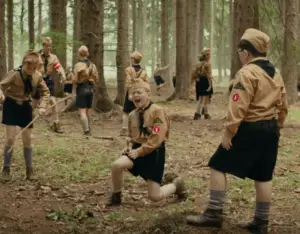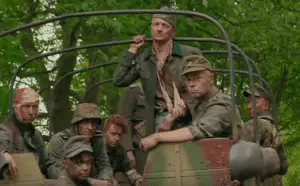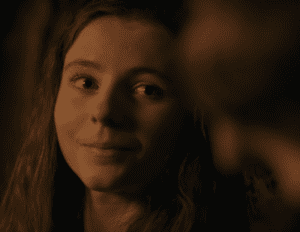I’m an enormous fan of Taika Waititi. I’ll admit, though, when I heard the premise of Jojo Rabbit, I thought the Jewish-Maori New Zealand director had lost his mind. It seemed that his period of brilliance had come to an end. Seeing the trailer didn’t help. A little boy in WWII Germany with Hitler as his imaginary friend? Taika himself playing Hitler? Waititi has finally made a misstep, I thought. There is no way this movie is going to work, especially not in a time like this. Now is not a super great time to be joking about Nazis.
I saw the film largely because curiosity got the better of me – and, somehow, Waititi pulled it off. (Check out The Fandomentals’ official review here.) Not only does this movie very much work in a time like this, but it’s a movie we really need. Jojo Rabbit uses the historical setting and the book Caging Skies as a jumping-off point, but Waititi is very much making commentary on today. The movie is a take-down of Nazi ideology: not just its anti-Semitism, but also its toxic masculinity and misogyny. The movie applies as much to the modern-day strains of this thinking as the 1945 strains, if not more.
Jojo Rabbit shows Nazi Germany entirely through the perspective of a little boy, Jojo (Roman Griffin Davis). Children accept what is around them as normal, up to a point, which is why, at least initially, Nazi propaganda might seem normalized and not overtly critiqued in this movie. The indictment of the ideology depends on us watching the movie as adults, with our eyes open, knowing our history and noticing things in the background. For Jojo, though, Nazi thinking is the air he breathes. In his time and place, acceptance by peers and adults alike depends on being in the Hitler Youth. Plus, Jojo gets the added bonus of rebelling against his mom, Rosie (Scarlett Johansson). Jojo doesn’t know his mom is part of the resistance movement against the Nazi party, but she does constantly try to talk him away from his bigoted thinking and Hitler-worship, which he resents. Why Jojo starts the movie with the beliefs he does makes sense.
The crux of the movie is how Jojo comes to believe anything different. How that happens, of course, is being confronted head-on with living, breathing proof that all the bigotry he’s been taught is lies. That proof is in the form of Elsa (Thomasin McKenzie), a young Jewish woman who his mother has been hiding in a secret crawlspace in their house. Crucially, Jojo does not just learn to reject the anti-Semitism, but also the toxic masculinity aspects of his Nazi programming.

In the Hitler Youth camp where the movie begins, toxic masculinity is tightly bound up with the anti-Semitism that the children are indoctrinated with. At the camp, boys are taught that they must kill, or else be ridiculed for being weak: this is how Jojo gets his pejorative nickname, by refusing to kill a rabbit. How can you kill Jews for the Fatherland, the older boys mock Jojo, if you can’t even kill a small animal? The Nazis running the Youth Camp paint Jews as weak (and also paradoxically monstrous), and reinforce the teachings Jojo has already absorbed that “Germans” (i.e., non-Jewish men) must subjugate and kill Jews in order to be strong.
Jojo already has a rebellious idea working against this toxic masculinity, in the form of counsel his imaginary friend gives him: maybe being a rabbit is a good thing. Rabbits are clever, brave, and fast. But he works hard through much of the movie to fulfill the toxic expectations of his society, starting with hilariously injuring himself trying to be manly with a hand grenade. More sinisterly, he tries multiple times to attack Elsa once he discovers her, despite his fear of her. She’s bigger than him, but he’s been taught that Jews are weak, and also that women are weak. This gets thrown in his face again and again, as Elsa overpowers him each time, easily disarming him of his Hitler-Youth-issued knife (and several subsequent knives.)
Elsa overpowering and outsmarting Jojo over and over is how Jojo learns that Jews are not weak or inferior. At the same time, his ability to hurt her feelings – through a fabricated break-up letter from her (late, as we later find out) fiancée – teaches him that she is human. What Jojo enacts through this letter is a double lesson against toxic masculinity. First, his only way to have any power over Elsa is through feelings; second, he immediately feels guilty for having hurt her in this way, because he can see that she has human emotions just like he does. From that point onward, he warms up to her, and they become friends.
Even milder examples of toxic masculinity are torn apart in front of Jojo, and in front of us, the viewers. Initially, it might seem funny to us that Jojo has drawn a series of pictures of Elsa’s fiancée meeting violent deaths. This takes on new meaning when the Gestapo character played by Stephen Merchant, a study in the banality of evil, looks through the drawings. He chuckles to himself and praises Elsa (who strategically takes credit for the drawings) for her ingenuity. This man’s job is to hunt out Jewish people hiding in homes and send them to their deaths; he approves of this young boy’s violent fantasies toward a man who (the audience realizes, if we hadn’t previously) is/was probably Jewish. The connection is made between a boy’s fantasy of killing his rival and Nazis killing Jews – the fantasies are a first step in a violent system of thought.

The misogyny of Nazism, of war, and of day-to-day life are shown and refuted throughout the movie. However, it is shown through things happening in the background, that Jojo may or may not take notice of. From the get-go, at the Hitler Youth Camp, the boys and girls are separated. It is announced that boys will be learning a list of exciting and fun activities, including learning to use weapons and orienteering, whereas girls will learn kitchen work and cleaning, as is “proper” for them. In a moment of dark humor, Rebel Wilson’s character, Fraulein Rahm, mentions a shockingly high number of babies she has had for Germany. This joke doesn’t come out of nowhere; Nazi thought actually held that the main use of women was as vessels for making more Aryan babies. At the time, women college students were pressured to drop out of school so they could get to work reproducing.
The Nazi stance on women contrasts starkly with what we see in the women characters in the movie. Jojo’s mom, Rosie, is witty and daring, and – we learn – incredibly brave, risking and ultimately sacrificing her life for the resistance movement. Elsa is also brave, smart, and strong. And all the women of the town participate in the fighting when the Allied Forces invade at the end of the movie – in fact, each and every one of them is needed for the town’s last stand. We see a skinny townswoman solemnly firing a missile launcher, and a teenage girl with braided hair holding a machine gun and running into battle. So much for what’s proper for girls.
Misogyny lurks elsewhere, if we pick up on signs that Jojo no doubt misses. As he bikes home with his mom, they are passed by a truck of returning soldiers. The soldiers, bruised and battered by combat, stare at Rosie. As she smiles at them and greets them, they continue to stare at her, faces impassive, not responding as you would to another human – they stare as if at a piece of meat, or as a hungry dog at a rabbit. Rosie’s smile grows wider. “Welcome home, boys,” she says cheerily. “Now go home and kiss your mothers!” With this simple, friendly statement, Rosie does her best to protect herself from the threat of sexual violence. She reminds them they have mothers; she reminds them that she is a mother (her son is bicycling next to her). She does this with the confidence and ease of someone who has practiced such moves for years. It is a reminder of the danger of being a woman in wartime, or any time.
As a Jewish woman during the Holocaust, Elsa has faced danger from many sources, and not just from Nazis. In a moment of opening up to Jojo about her past, Elsa explains that, after her parents were sent to the death camps, a “friend of [her] father’s” hid her. After that, a friend of his, and then more friends of friends. “And then your mother took me in,” she says to Jojo, brightening her tone and smiling, making eye contact with him for the first time in this speech. It doesn’t take a lot of imagination to realize the vulnerability Elsa has been in, a teenage girl, utterly dependent for survival on the mercy of male friends of her father, and then strangers. In an earlier scene, Rosie told Elsa, with sympathy, “You’ve lived more lifetimes than most.” Part of what Elsa has been through, it is implied, is sexual abuse. Jojo is too young to read between the lines, but as adults in the audience, we can.
Jojo, too, is tempted to exert his power over Elsa at the end of the movie. He has fallen in love with Elsa and lost his mom; he is terrified of losing Elsa, the last person he has left. The war has ended, and Jojo knows that Hitler is dead and Germany lost. He knows it is now safe for Elsa to come out. But he also knows the power he holds over her, even as a 10-year-old boy who has no right to have such power. Because Elsa is Jewish in 1940s Germany, he can lie to Elsa, say that Germany won, and selfishly keep her forever. However, he can no longer live with this ill-earned power. He knows Elsa’s humanity, and he feels too guilty taking away her freedom – keeping her like a rabbit in a cage. Soon after, he tells her he will help her escape, and they get ready and go outside. When Elsa sees the American Jeeps driving through the town, she gives him one good slap for lying to her. Jojo calmly takes it – and he admits that he deserved it. By rejecting anti-Semitism and toxic masculinity, he has actually started the process of growing up: he accepts the consequences for his actions and moves forward.

Meanwhile, the women characters in the film defy the violence around them and the sexist stereotypes about the usefulness of women that come from Nazi ideology. Rosie dies doing the heroic work of the resistance. Elsa survives, keeping her fierceness but not walling off her ability to love. In one of her late-night conversations with Rosie, Elsa gazes with open admiration (and possibly other feelings) at Rosie, a glamorous, charismatic fighter, and asks her for advice – asks her for help finding her identity as a woman in this world. Rosie gives Elsa her own poetic take on womanhood:
“Sure, you drink. Champagne, if you’re happy. Champagne if you’re sad. You drive a car, gamble if you want, own diamonds… Learn how to fire a gun. And travel to Morocco. Take up lovers, make them suffer. Look a tiger in the eye… And trust without fear. That’s what it is to be a woman.”
In the final scene of the film, Elsa recapitulates advice from Rosie of what to do with life: Dance. Dance your defiance, dance your freedom. Even though we started the movie with an apt comparison of 1940s Hitler adoration with Beatlemania, it seemed jarring to me, at first, seeing Elsa and Jojo dance 1960s-style moves to David Bowie singing in German. As a viewer, I was once again yanked out of the historical setting. I wondered, puzzled, why Waititi decided to have them dance in this anachronistic way?
But then I got it: The anachronism was on purpose. Waititi wants us to understand that what he’s talking about in this movie is timeless; it’s now. Nazi ideology is in resurgence worldwide. The poison of their anti-Semitism is not some distant, historical threat; it is here. Misogyny and sexual violence never went away. The death toll of toxic masculinity is rising. Waititi is not just throwing shade at Hitler, which would be too easy to do. Jojo Rabbit is his acknowledgment of, and a timely middle finger to, the Nazi thought of 2019. Resist. Be the rabbit. And dance, because that is what free people do.

